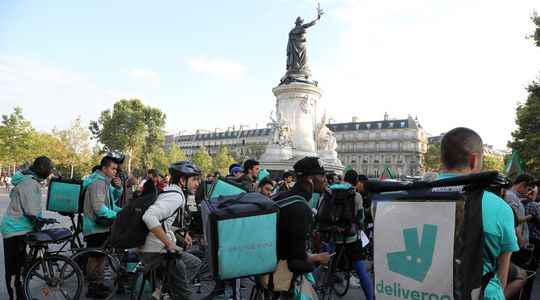Could a strong decision by the French courts relaunch a European debate? For the first time, the Deliveroo platform was fined 375,000 euros on Tuesday April 19 for “hidden work”. Enough to resurrect the proposal of the European Commission to legislate in order to requalify as employees the delivery people employed as self-employed. Objective of this directive: to fight against the precariousness of these underpaid workers who are unable to access social security coverage. But the legislation of the States of the European Union on the subject is to date so diverse that a common agreement seems difficult to find.
- Spain and Portugal in agreement with the proposal
Since August 2021, Spain has required delivery platforms to qualify their workers as employees, which allows them to benefit from the advantages attached to this status, such as a fixed salary and paid holidays. Portugal tabled a bill last October aimed at allowing self-employed workers on these platforms to become employees.
These two countries have therefore legislated at national level but they share the European Commission’s proposals and would not oppose the adoption of a Community text. Similarly, Germany and Italy have come out in favor of the employee status granted to platform workers. In the Netherlands, a court decision handed down in February 2021 also went in this direction, declaring that the deliverers of the Deliveroo platform were entitled to an employment contract.
- Hungary and Poland hostile, Sweden and Denmark independent
In the name of the theory of comparative advantage, which states that a country has an interest in specializing in an area where its costs are lower than those of its neighbours, States such as Hungary and Poland are not prepared to adopt an agreement that would de facto eliminate their comparative advantage in social matters. Estonia, the parent nation of the delivery company Bolt, reasons in the same way and does not want to see its creation hampered by an overly strict legislative framework.
Often put forward for its social model, Sweden prefers to rely on a collective bargaining format that has been in place for several years. In this country where nearly 80% of employees are unionized, collective agreements can replace the laws governing labor law. Sweden therefore sees no point in having to change a particular policy with which she is fully satisfied, in the name of a still vague European project. This opinion is shared by Denmark, which is reluctant to touch its mode of operation.
- France’s delicate position
European country with the largest number of platforms, France is to be placed on the side of the sceptics, if not countries hostile to the Commission’s project. In recent years, the government has encouraged the development of self-employed status, believing that this favors the entry into the market of people who have not been integrated into it until now. She would therefore prefer that the rights of the self-employed be upgraded and not be forced to modify their contracts.
But after the condemnation of Deliveroo for “hidden work” and the increasingly strong criticism of the population towards these platforms, the next President of the Republic will find it difficult not to act in favor of a regulations much more respectful of workers.
